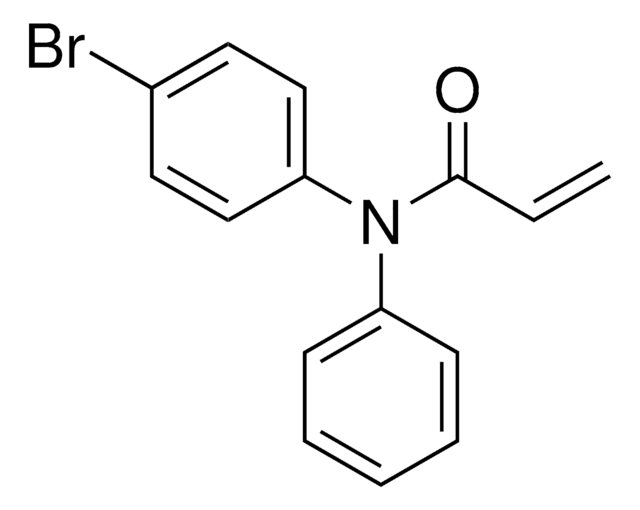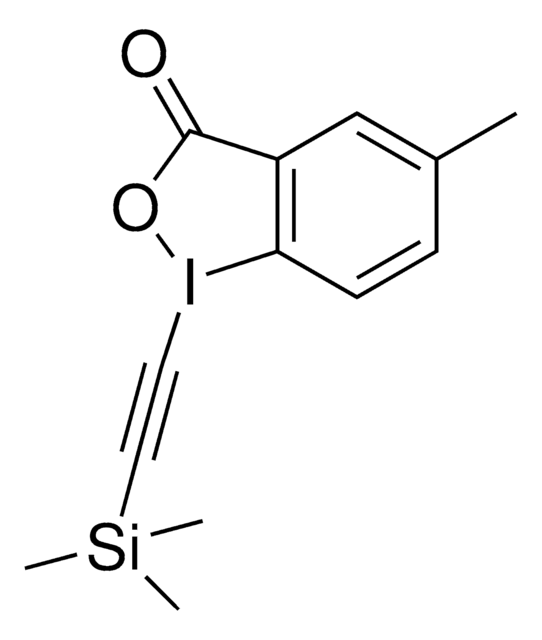Összes fotó(1)
Fontos dokumentumok
925144
KB05yne
≥95%
Szinonimák:
4-(N-(4-Bromophenyl)acrylamido)-N-(hex-5-yn-1-yl)benzamide, Functionalized scout fragment
Bejelentkezésa Szervezeti és Szerződéses árazás megtekintéséhez
Összes fotó(1)
About This Item
Tapasztalati képlet (Hill-képlet):
C22H21BrN2O2
Molekulatömeg:
425.32
UNSPSC kód:
12352101
NACRES:
NA.22
Javasolt termékek
Minőségi szint
Teszt
≥95%
form
powder or solid
reakcióalkalmasság
reagent type: chemical modification reagent
reaction type: click chemistry
tárolási hőmérséklet
2-8°C
Alkalmazás
KB05yne is a cysteine-reactive small-molecule fragment for chemoproteomic and ligandability studies for both traditionally druggable proteins as well as "undruggable," or difficult-to-target, proteins. This fragment electrophile is the functionalized version of KB02 (912131)
Related useful products may include: Cysteine-reactive fragments: KB02 (912131), KB03 (912654), KB05 (911798), sulfoxide (925136), CoLDR probe (923818) Functionalized scout fragments: KB02-COOH (925047), KB02yne (925225) Electrophilic degraders featuring scout fragments: KB02-SLF (914738), KB03-SLF (914975), KB05-SLF (913715), Biotin-SLF (914223) Cysteine-reactive probes for chemoproteomics: IA alkyne (924237), IA 5-TAMRA (925020), desthiobiotin iodoacetamide (923826), or biotin iodoacetamide (B2059)Related useful products may include: Cysteine-reactive fragments: KB02 (912131), KB03 (912654), KB05 (911798), sulfoxide (925136), CoLDR probe (923818) Functionalized scout fragments: KB02-COOH (925047), KB02yne (925225) Electrophilic degraders featuring scout fragments: KB02-SLF (914738), KB03-SLF (914975), KB05-SLF (913715), Biotin-SLF (914223) Cysteine-reactive probes for chemoproteomics: IA alkyne (924237), IA 5-TAMRA (925020), desthiobiotin iodoacetamide (923826), or biotin iodoacetamide (B2059)
Technology spotlight: Proteomic Ligandability Assessment
Related useful products may include: Cysteine-reactive fragments: KB02 (912131), KB03 (912654), KB05 (911798), sulfoxide (925136), CoLDR probe (923818) Functionalized scout fragments: KB02-COOH (925047), KB02yne (925225) Electrophilic degraders featuring scout fragments: KB02-SLF (914738), KB03-SLF (914975), KB05-SLF (913715), Biotin-SLF (914223) Cysteine-reactive probes for chemoproteomics: IA alkyne (924237), IA 5-TAMRA (925020), desthiobiotin iodoacetamide (923826), or biotin iodoacetamide (B2059)Related useful products may include: Cysteine-reactive fragments: KB02 (912131), KB03 (912654), KB05 (911798), sulfoxide (925136), CoLDR probe (923818) Functionalized scout fragments: KB02-COOH (925047), KB02yne (925225) Electrophilic degraders featuring scout fragments: KB02-SLF (914738), KB03-SLF (914975), KB05-SLF (913715), Biotin-SLF (914223) Cysteine-reactive probes for chemoproteomics: IA alkyne (924237), IA 5-TAMRA (925020), desthiobiotin iodoacetamide (923826), or biotin iodoacetamide (B2059)
Technology spotlight: Proteomic Ligandability Assessment
kapcsolódó termék
Product No.
Leírás
Árazás
Tárolási osztály kódja
10 - Combustible liquids
WGK
WGK 3
Lobbanási pont (F)
Not applicable
Lobbanási pont (C)
Not applicable
Válasszon a legfrissebb verziók közül:
Analitikai tanúsítványok (COA)
Lot/Batch Number
Sajnos jelenleg COA nem áll rendelkezésre ehhez a termékhez online.
Ha segítségre van szüksége, lépjen velünk kapcsolatba Vevőszolgálat
Már rendelkezik ezzel a termékkel?
Az Ön által nemrégiben megvásárolt termékekre vonatkozó dokumentumokat a Dokumentumtárban találja.
Electrophilic PROTACs that degrade nuclear proteins by engaging DCAF16
Xiaoyu Zhang, et al
Nature Chemical Biology, 15(7), 737-746 (2019)
Vincent M Crowley et al.
ACS central science, 7(4), 613-623 (2021-06-01)
Covalent ligands are a versatile class of chemical probes and drugs that can target noncanonical sites on proteins and display differentiated pharmacodynamic properties. Chemical proteomic methods have been introduced that leverage electrophilic fragments to globally profile the covalent ligandability of
Xiaoyu Zhang et al.
Nature chemical biology, 15(7), 737-746 (2019-06-19)
Ligand-dependent protein degradation has emerged as a compelling strategy to pharmacologically control the protein content of cells. So far, however, only a limited number of E3 ligases have been found to support this process. Here, we use a chemical proteomic
Tudóscsoportunk valamennyi kutatási területen rendelkezik tapasztalattal, beleértve az élettudományt, az anyagtudományt, a kémiai szintézist, a kromatográfiát, az analitikát és még sok más területet.
Lépjen kapcsolatba a szaktanácsadással








